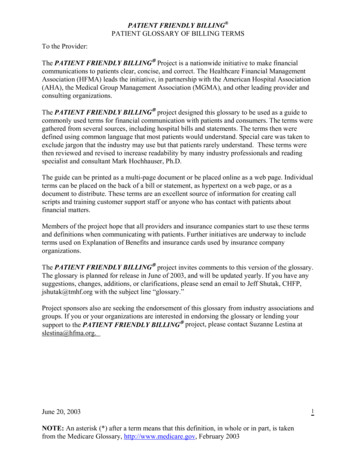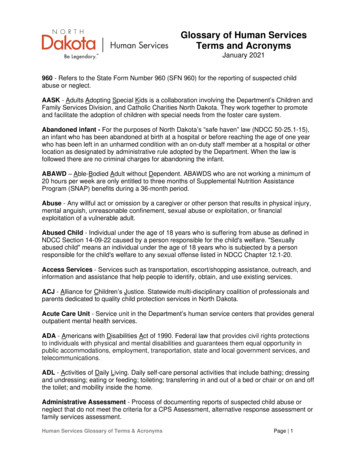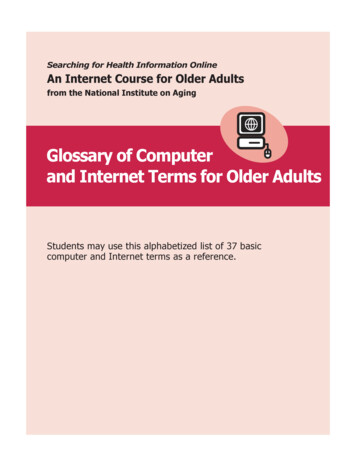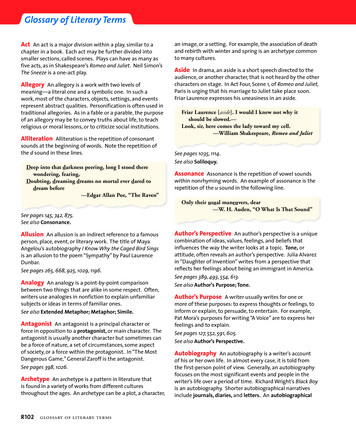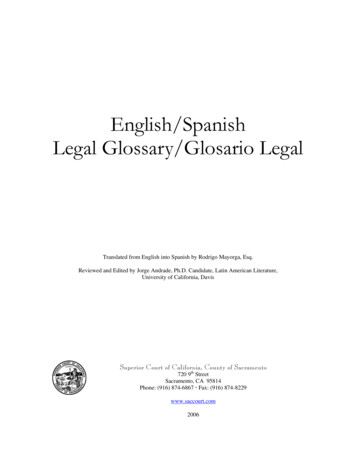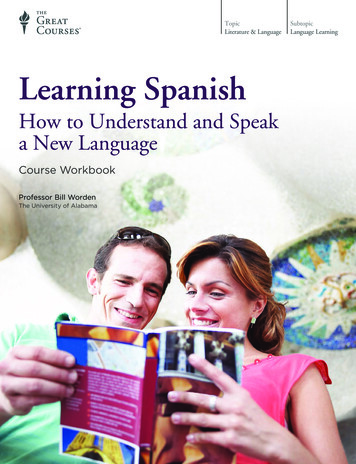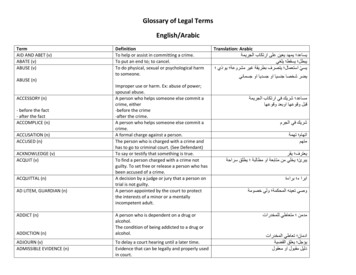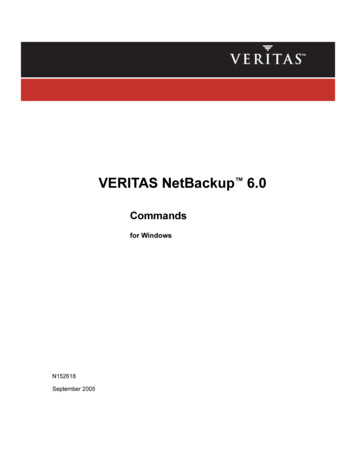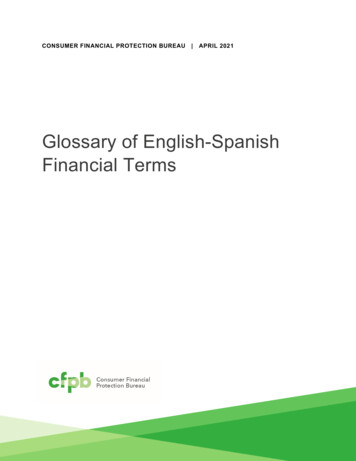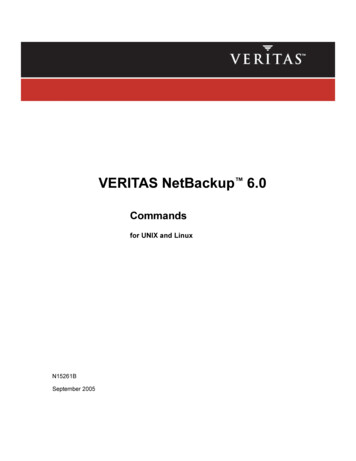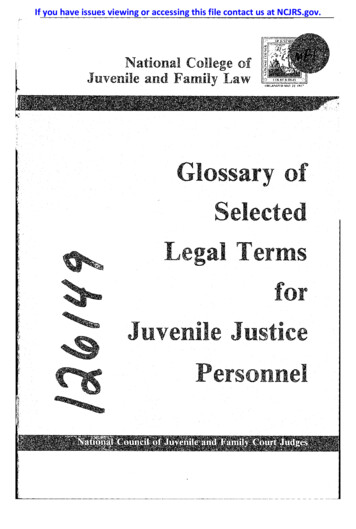
Transcription
If you have issues viewing or accessing this file contact us at NCJRS.gov.I National College ofJuvenile and Family LawGlossary ofSelectedLegal TermsforJuvenile JusticePersonnelr
National College ofJuvenile and Family LawGlossary ofSelectedLegal TermsforJuvenile JusticePersonnelr[1fIf1 fffiM,fiii'nilifdi,'if. ,. ; I , ! ' l ". , ., .
126149U.S. Department of JusticeNational Institute of JusticeThis document has been reproduced exactly as received from theperson or organization originating it. Points of view or opinions statedin this document are those of the authors and do not necessarilyrepresent the official position or policies of the National Institute ofJustice.Permission to reproduce this copyrighted material has beengranted byNational Council of Juvenileand Family Court Judgesto the National Criminal Justice Reference Service (NCJRS).Further reproduction outside of the NCJRS system requires permission of the copyright owner.
National Council of Juvenile lnd Family Court JudgesRomae T. PowellPresidentAtlanta, GeorgiaJerry L. MershonChairman, Publications Policy GroupManhattan, KansasDean Louis W. McHardyExecutive DirectorReno, NevadaEDITORIAL STAFFRene MacuraProduction EditorNational Council of Juvenile and Family Court JudgesP.O. Box 8970, Reno, NV 89507Copyright, 1978First Printing, 1978Second Printing, 1985Third Printing, 1988This monograph has been reprinted under Grant No. 87-MU-CX-OOOI (S-2) fromthe Office of Juvenile Justice and Delinquency Prevention, Office of Justice Programs,U.S. Department of Justice. Points of view or opinions in this document are those ofthe author and do not necessairly represent the official position or policies of the U.S.Department of Justice.iii
.ForewordSocial and legal systems are constantly evolving. Associatedwith this process is a new .and changing terminologynot found in our daily conversation. This situation is nowheremore true than in the juvenile justice system which, in manyinstances, has a unique vocabulary of its own. Meanwhile, itbecomes increasingly apparent that all of us who have a role inthe juvenile justice system - be it judge, social worker, guardian, probation officer - must be well-versed in the languageof the juvenile courts in order to protect and adequately represent children.The National Council of Juvenile and Family Court Judgesis pleased to offer the Glossary of Selected Legal Terms forJuvenile Justice Personnel as an acknowledgement of thediversity we see in the many dedicated professionalS lllvolvedin our juvenile and family courts, and as a contribution toensure each voice is properly heard. The Glossary is notintended to be all-inclusive. The terms and phrases provided,however, are among those most frequently encountered. Wesincerely hope it will be useful to you both in your studies atthe National College of Juvenile and Family Law and in yourprofessional practice.Cordially,Louis W. McHardy, DeanExecutive DirectorNational College of Juvenile and Family Lawv
GLOSSARY OF SELECTED LEGAL TERMSFORJUVENILE JUSTICE PERSONNELABANDONMENT: A parent's or custodian's act of leaving a childwithout adequate care, supervision, support or parental contactfor an excessive period of time; an express or implied intention tosever the parent-child relationship and avoid the obligations arising from the relationship. Also, the desertion of one spouse bythe other with intent to terminate the marriage relationship. In anumber of jurisdictions, the term "abandonment case" is used torefer to a suit to terminate parental rights.ADJUDICATION: The process of rendering a judicial decision asto whether the facts alleged in a petition or other pleading aretrue. An adjudicatory .hearing is that court proceeding in which itis determined whether the allegations of the petition are supportedby legally-admissible evidence; also called a "Jurisdictional" oran "Evidentiary" hearing.ADMISSIBLE EVIDENCE: Evidence which can legally andproperly be used in court.ADMISSION: 1) A statement tending to establish the guilt of theperson making the statement. 2) The transfer of a minor's physical custody to a detention or shelter fa.ci Ii ty .AFFIDA VIT: A written statement of facts signed under penalty ofperjury, often before a court clerk or notary public who administers the oath to the signing party, who is called the affiant ordeclarant. Affidavits are routinely required for the procurementof warrants and are used in some jurisdictions to initiate juvenilecourt proceedings. They may be admitted into evidence.ALLEGA TION: A charge or claim of fact set forth in a petition orother pleading, which is proven true or false at an adjudicatoryhearing.ANNUAL REVIEW: Yearly judicial review, usually in dependency cases, to determine whether the child requires continuedcourt supervision or placement. Increasingly required by statelaws; but also often set as policy by local court rule. Sometimesreviews are required at other than yearly intervals.APPEAL: Complaint to a higher court urging that it overturn thedecision of a lower court. Appellate (higher) courts normallyreview questions of law on appeal, not determinations of fact.The review is conducted upon the record of the lower tribunal'sproceedings. Sometimes the term appeal is used in a technicalsense to refer to upper-court review which is undertaken as amatter of right, as opposed to review granted on a discretionarybasis (see CERTIORARI). More commonly, however, the termrefers to any upper-court review.
APPELLANT: The party who initiates an appeal.APPELLEE: The party against whom an appeal is taken; alsocalled the respondent.BATTERED CHILD SYNDROME (B.C.S.): Physical conditionof a child indicating that external or internal injuries result fromacts committed by a parent or custodian. Also termed ParentInfant Trauma Syndrome (P.I.T.S.).BURDEN OF PROOF: The duty to establish a claim or alIegationby admissible and credible evidence at the time of hearing. Thisis usually the duty of the state; it is up to the state to prove its casewith respect to a minor or parent, and it is not the minor's orparents' duty to explain or disprove unproven allegations.CERTIFICATION: Generaily used to refer to the process of transferring a minor's case from the juvenile court to the adult courtfor trial. However, the tenn has widely varying meanings, andlocal state laws must be consulted for the particular meaning inthat state.CERTIORARI: A writ issued by an appellate court accepting alowercourt decision for review. Usually used to refer to reviewthat is not required, but granted as a matter of judicial discretion.CHILD ABUSE: Traditionally, any physical mistreatment of achild, as opposed to child neglect or negligent care. However, theterm is increasingly used to cover any "physical or mental injury,sexual abuse, negligent treatment or maltreatment of a child .by a person who is responsible for the child's welfare undercircumstances which indicate that the child's health or welfare isharmed or threatened thereby," and is so defined in the federalChild Abuse Prevention and Treatment Act (Pub. Law 93-24,1974).CHILD NEGLECT: Failure by a parent or custodian to renderappropriate care to a child; an act of omission by the personlegally responsible for a child's care which threatens the child'swell-being. Failure to provide a child with suitable food, shelter,clothing, hygiene, medical care or parental supervision.COMMON LAW: Law developed as the result of judicial decisions rather than by legislative enactments (see STATUTE).COMPLAINT: The initiating pleading in a criminal or civil case,filed by the moving party and setting out the cause of action.COMPETENCY: In the law of evidence, a witness's ability toobserve, recall and recount under oath what happened.CUSTODY: The right to or responsibility for a child's care andcontrol, carrying with it the duty of providing food, shelter, medical care, education and discipline.DELINQUENCY: The commission of an illegal act by a juvenile.Increasingly used to refer only to those acts which would be2
crimes if committed by an adult, but state laws vary in theirdefinitions.DEPENDENCY: Properly speaking, a situation where a child isdependent upon another for financial support, but widely used todescribe child neglect or child abuse cases. Though the term issomething of a misnomer when thus applied, it is so used in thelaw of a number of states.DETENTION: The temporary confinement of a minor by a publicofficer pursuant to law.DETENTION HEARING: A judicial hearing, usually held afterthe filing of a petition, to detennine the interim custody of aminor pending an adjudication of the petition.DISPOSITION: The order of a juvenile court determining what isto be done with a minor already adjudged to be within the court'sjurisdiction (at an adjudicatory hearing). Analogous to the sentence in a criminal case.DIVERSION: Procedures for handling relatively minor juvenileproblems informally, without referral to the juvenile court.DUE PROCESS: The constitutionally-guaranteed right of personsto be treated by the law with fundamental fairness. In juveniledelinquency proceedings, these include the right to adequatenotice in advance of the hearing, the right to counsel, the right toconfront and t:ross-examine witnesses, the right to refuse to giveself-incriminating testimony, and the right to have allegations ofconduct that would be criminal if committed by an adult provenbeyond a reasonable doubt.EQUITY: Historically, a system of remedial jurisprudence whichIgrew up separate and distinct from the common law and was notbound by its writs and precedents, so that it could accomplish justrelief where the common law could not. The legal system's exercise of jurisdiction over families and children is founded on principles of equity.EVIDENCE: Generally, any sort of proof put forth during a trialfor the purpose of influencing the judgment.Circumstantial Evidence: Evidence of circumstances from whichanother fact may be inferred. For example, proof that a minorowned a pair of channel-lock pliers may connect the minor to aburglary in which such pliers were used to gain entry.Direct Evidence: First-hand evidence, usually of a witness whosaw an act committed. For example, testimony of a witness thatshe observed a minor working at a door-knob with what appearedto be a pair of pliers would be direct evidence.Hearsay Evidence: Second-hand evidence, generally consisting ofa witness's testimony that he heard someone say something.Though there are numerous exceptions to the rule - often expressly provided by statute, as in the case of a number of state3
juvenile court acts allowing hearsay evidence in social studiespresented to the court - hearsay evidence is generally inadmissible because the person making the statement is not available forcross-examination, and because it is inherently unreliable.Opinion Evidence: Witnesses are normally required to confinetheir testimony to statements of fact and are not allowed to givetheir opinions in court. However, if a witness is qualified as anexpert in a particular field, he or she will be allowed to state his orher opinion as an expert based on certain facts.Physical Evidence: Any tangible piece of proof (document, X-ray,weapon, etc.). Also called "Real" evidence.EXPUNGEMENT: The destruction or sealing of records of minorsor adults, after the passage of a specified period of time or whenthe person reaches a specified age and has not committed anotheroffense. Sometimes provided for by statute and sometimes ordered by the court under its inherent powers. See also SEALING.EXTRAORDINARY WRIT: A writ, often issued by an appellatecourt, making available remedies not regularly within the powersof lower courts. They include writs of habeas corpus, mandamus,prohibition and quo warranto. Sometimes called "Prerogativewrits. "FAILURE TO THRIVE SYNDROME (F.T.T.): A serious medical condition in which a child's height, weight and motor development are significantly below average for his or her age. Usually, though not invariably, found in children less than one yearold. The syndrome may have an organic cause, or it may becaused by severe emotional or physical neglect.FELONY: A serious crime, generally punishable by imprisonmentin a state or federal penitentiary.FIFTH AMENDMENT: The Fifth Amendment to the U.S. Constitution, guaranteeing that a person cannot be compelled to present self-incriminating testimony in a criminal or juvenile proceeding.FITNESS HEARING: A hearing held in juvenile court to determine the fitness of a minor for retention in juvenile court, and theminor's amenability to juvenile court resources. Must be heldbefore any evidence is heard on the petition; a prerequisite totransfer of a minor's case to adult court. Also called "certification hearing," "remand hearing," "transfer hearing," or "waiver hearing" depending upon local practice.FOSTER CARE: A form of substitute care, usually in a homelicensed by a public agency, for children whose welfare requiresthat they be removed from their own homes.FOURTEENTH AMENDMENT: The Fourteenth Amendment tothe U.S. Constitution, securing to every person due process rightsto life, liberty and property when they are being dealt with understate law.4
FOURTH AMENDMENT: The Fourth Amendment to the U.S.Constitution, protecting every person against unlawful search andseizure.GUARDIAtJ AD LITEM: An adult person appointed by the courtto represent a child's interests in a particular judicial proceeding.(The phrase means "Guardian at Law"). Required by the federalChild Abuse Prevention and Treatment Act in every child abuseor neglect case which results in a judicial proceeding, if any stateis to qualify for federal funds under the Act. In some jurisdictionscalled the "Next Friend. "HABEAS CORPUS: Lit.,"You have the body"; an extraordinarywrit ordering a public officer holding a person in confinement tobring the person before the court for release. Used to secure therelease from custody of minors or adults being illegally held.HEARING: A trial or other proceeding before a judicial officerjudge, referee, commissioner, master, magistrate or chancellordepending upon the local jurisdiction or an administrativeagency.HEARING DE NOVO: kfull new hearing or trial, as opposed toreview on a transcript or rel:ord.HEARSAY: See under EVIDENCE.IMMUNITY, LEGAL: Legal protection from liability, such as theprotection given to reporting parties under child abuse reportingstatutes.IN CAMERA: Lit.," In chambers"; a hearing or judicial proceeding conducted in chambers or privately.INCEST: The crime of sexual intercourse between a male and afemale who are so closely related that they would not legally beallowed to marry.IN LOCO PARENTIS: Lit., "In the place of the parent"; refers toactions of a custodian, guardian or other person acting in theparent's place and stead.JURISDICTION: 1) The power of a particular court to hear casesinvolving certain categories of persons or allegations.2) A geographical area subject to a particular law or court.IiMALICE: The intentional commission of a wrongful act withoutlegal justification with the intent of inf1icting injury or harm, orunder circumstances such that the person acting should reasonably have known that injury or harm would result.MANDAMUS: Lit., "We order"; an extraordinary writ issued by ahigher court and directed to a public executive or administrativeofficer or agency, or the judge of a lower court, commanding theperformance of a specified act. Also known as "Writ of Mandate."5
MATERIAL: Evidence that relates to a substantive part or elementof a case.MIRANDA RULE: From the U.S. Supreme Court case of Mirandav. Arizona, 384 U.S. 436 (1966), the rule that confessions areinadmissible at trial if the police do not advise the subject ofcertain rights before questioning him or her. The rights of whichthe subject must be advised include:a) The right to remain silent and to refuse to answer any questions;b) The right to know that anything he or she says can and will beused against him or her in a court of law;c) The right to consult with an attorney and to have an attorneypresent during questioning;d) The right to have counsel appointed at public expense, prior toany questioning if the subject cannot afford counsel.Though the U.S. Supreme Court has not ruled directly on thequestion, good practice and the laws of many states require thatthe warnings be given in juvenile cases. Moreover, some stateshave required that a minor be advised of the right to have aparent, relative or other advisor present during questioning, inaddition to counsel.MISDEMEANOR: A crime less serious than a felony, usuallypunishable by a fine or incarceration in a city or county jail, butnot a state penitentiary.MOVING PARTY: The party who initiates a lawsuit or otherjudicial proceeding. In juvenile court, this is usually the probation officer or prosecuting attorney who files the petition.NEGLIGENCE: Failure to exercise the care that an ordinarily prudent person would exercise in the same circumstances . NEXT FRIEND: See GUARDIAN AD LITEM.ORDINANCE: A law enacted by the governing body of a city orcounty.PARENS PATRIAE: Lit., "The father of his country"; from English law, the legal doctrine unaer which the Crown assumed theprotection of certain minors, orphans, and other persons in needof protection. Though not wholly accurate, the phrase is sometimes used to express the benevolent and rehabilitative philosophy of the juvenile court.PARENT INFANT TRAUMA SYNDROME (P.I.T.S.): SeeBATTERED CHILD SYNDROME.PETITI0N: A civil pleading filed to initiate a matter in juvenilecourt, setting forth the alleged grounds for the court to take jurisdiction of the case and asking the court to do so and intervene.PINS: Person in need of supervision; a juvenile status offender whois involved in non-criminal misbehavior. Depending upon the6
state, also "CHINS" (Child in Need of Supervision), "JINS"(Juvenile in Need of Supervision), "MINS" (Minor in Need ofSupervision), "Beyond Control Child," "Incon-igible," "Wayward Youth," "Miscreant," etc. See STATUS OFFENSE.IiPLEA BARGAINING: Negotiation of an agreement betweenprosecuting and defending counsel, often with the agreement ofthe court, to have the accusect plead guilty to certain reducedcharges in return for the dismissal of others, or for a reduceddisposition or penalty.PLEADING: Anyone of the form :d written statements of accusation or defense in an action at law.PRIMA FACIE: Lit., "On the first appearance"; evidence whichon its face makes out the necessary elements of the allegation,and which will suffice to establish that allegation as true until it iscontradicted and overcome by other evidence.PRIVILEGED COMMUNICATIONS: Confidential communications to certain persons that are protected by law against forceddisclosure. Privileged communications cannot be disclosed incourt over the objection of the holder of the privilege. (The holderof the privilege is usually the patient, client, or other personreceiving care, rather than the provider of that care.) Communications between lawyer and client, physician and patient,psychotherapist and patient, priest, minister or rabbi and penitent. are typically privileged. Some social workers are alsocovered by privilege in some states, but the law varies widelyfrom state to state as to the classes of persons to whom thecommunications are privileged; who may invoke the privilege;and similar matters. Generally, the privilege onl}! protects thecommunication from disclosure in court or in connection with acourt case.PROBATION: In adult or juvenile court, a disposition which allows the defendant or the minor to remain at liberty under thesupervision of a probation officer, frequently with a suspendedcommitment or sentence of imprisonment and usually requiringcompliance with certain stated conditions.PROTECTIVE CUSTODY: In child abuse and neglect cases, theemergency removal of a child from his home when the childwould be in imminent danger if allowed to remain with the parent(s) or custodian(s).QUANTUM OF PROOF: See STANDARD OF PROOF.QUO WARRANTO: Lit., "By what authority . ?" an extraordinary writ usually issued by a higher court to prevent continuedassertion of unlawful authority by a public officer.REHEARING: In some states, an order by a referee or commissioner may be reviewed by the presiding judge of the juvenilecourt if the minor or parents so request. If there is no transcript of7
the original hearing, the review will commonly have to take theform of a new hearing (hearing de novo), which is called a rehearing. If the first hearing was recorded and a transcript exists, thereview may be made on the transcript and the court may order arehearing at its discretion. The term is also used when a matter isreconsidered by the judicial officer who first hea!"d it, for thepurpose of modifying an order or disposition.RELEVANT: Evidence that is logically connected to, and helps toprove, a material point or issue in a case.REMAND: Lit., "to send back"; frequently used to describe theorder transferring a minor to adult court for trial, or an adultcourt's order sending a minor to the juvenile court. See alsoCERTIFICATION, FITNESS HEARINGS, TRANSFER ANDWAIVER.REPORTING STATUTES: State laws requiring certain designated persons (physicians, nurses, teachers and the like) to reportto proper authorities suspected cases of child abuse and injuriesinflicted by unlawful means. Such statutes commonly confer immunity from any liability on the person required to make thereport.RES IPSA LOQUITUR: Lit., "The thing speaks for itself"; alegal doctrine that allows evidence to be admitted even though noone actually saw what happened, only the results. For example,in a child abuse case the medical reports indicating multiple broken bones and reflecting the physician's opinion that they couldnot have been sustained by accident would be admissible eventhough no witness saw anyone strike the child. Under this doctrine, the court can convict a person having exclusive custody ofan abused child and/or assert juvenile court jurisdiction over thechild even though there was no direct testimony as to how, when,where or by whom the injuries were inflicted.RESPONDENT: 1) The person who is the subject of a petition.2) The prevailing party in a court case against whom an appeal istaken.SEALING: In a juvenile court practice, the closure of juvenilerecords to all inspection except by the minor upon petition to thecourt. See EXPUNGMENT.SOCIAL STUDY: The report prepared by a probation officer orsocial caseworker for the judge's consideration at a dispositionalhearing. Such reports review the minor's behavior and familyhistory and frequently contain material that would be inadmissible in most judicial proceedings because of hearsay, lack of verifkation, etc. In many states, specific statutes permit their admission into evidence. Social studies may not be received by thecourt until after the petition has been adjudicated and jurisdictionestablished. Also called "social history," "social report," or"probation report."8
STANDARD OF PROOF: There are varying requirements ofproof in different kinds of judicial proceedings. In criminal anddelinquency cases, the offense must be proven beyond a reasonable doubt. In neglect and dependency proceedings, and in civilcases generally, the standard of proof is by a preponderance ofthe evidence, a significantly lower standard which requires thatthe judge believe that it is more likely than not, on the evidencepresented, that neglect occurred. In some states, the standard ofproof in PINS cases and in abuse and neglect proceedings is byclear and convincing evidence, a standard more stringent thanpreponderance of the evidence and less demanding than beyond areasonable doubt. See also QUANTUM OF PROOF.STARE DECISIS: Lit., "To stand by the decision"; legal doctrinewhich requires adherence to legal precedents (decisions of appellate courts) until they are overruled by the same or higher courts.STATUS OFFENSE: The term essentially refers to non-criminalmisbehavior, which would not be criminal if committed by anadult (e.g., truancy, runaway, etc.). The behavior is an offenseonly because of the minor's status as a minor.STATUTE: A law enacted by a state legislature or the U.S. Congress.STIPULATION: An agreement between the attorneys in a case,entered into in court, allowing a certain fact to be established inevidence without the necessity for further proof. Depending uponthe requirements of the particular jurisdiction and the nature ofthe proceedings, stipulations may either be written or oral.SUBPOENA: A legal document, usually issued by a court clerk,requiring that the person named in the subpoena appear on astated day and time at a specified court to give testimony in acase. A subpoena must be served personally on the personnamed; this is usually done by a law enforcement officer, probation officer, child protective services worker, or process server.Failure to obey a subpoena is punishable as a contempt of court.SUBPOENA DUCES TECUM: Lit., "Bring with you"; a subpoena served upon the person who has custody of records, commanding that such custodian bring the specified records to courton the stated day and time.SUMMONS: 1) A legal document, issued by the court clerk orother court officer, notifying the ll lmed person that a law-suit orlegal cause has been filed against or involves him or her, andnotifying such person of any dates set for hearings and deadlinesfor responding to the complaint or petition. The purpose of asummons is simply to notify the persons concerned; it does notrequire court attendance by any person.2) In some states, a citation issued by a law enforcement officerfor a traffic violation or other minor offense is known as a sum9
mons. Citations do require the persons to whom they are issued toappear in court.TERMINATION OF PARENTAL RIGHTS: A judicial proceeding freeing a child from all custody and control by a parent orparents, so that the child can be adopted by others.TESTIMONY: A statement or declaration made to establish a factor facts and given under oath.TRANSFER: The sending of a case from the juvenile court to adultcourt for trial. See also CERTIFICATION, FITNESS HEARING, REMAND and WAIVER.V01R DIRE:1) Procedure by which attorneys questions prospective jurors to determine any biases or prejudices.2) In some states, procedure by which lawyers question expertwitnesses to determine their qualifications before the experts arepermitted to give opinion testimony.WAIVER:1) The understanding, and voluntary relinquishment of aknown right, such as the right to counselor the right to remainsilent during police questioning.2) The juvenile court's relinquishment of its jurisdiction over aminor, and transfer of the case to adult court for trial. See alsoCERTIFICATION, FITNESS HEARING, REMAND andTRANSFER.WARD: A minor who is under the jurisdiction of the juvenile courtfor a delinquent act, status offense, or an allegation or finding ofabuse, neglect, or dependency. Also, a person who has a legallyappointed guardian is the ward of that guardian.WARRANT: Legal document issued by a judge authorizing thesearch of a place and seizure of specified items found there(search warrant), or the arrest or detention of a specified person(arrest warrant). No hearing is required and the person need notbe notified, but the court must be given probable or reasonablecause to believe that the warrant is necessary for apprehensionbefore it issues a warrant. Affidavits are frequently used in establishing this probable or reasonable cause.WRIT: An order issued by a court commanding that a certain act oracts be done or not done. There is a wide variety of special writs,and much state-to-state variation in testimony, law and practice.10
more true than in the juvenile justice system which, in many instances, has a unique vocabulary of its own. Meanwhile, it becomes increasingly apparent that all of us who have a role in the juvenile justice system - be it judge, social worker, guar dian, probation officer - must be well-versed in the language

